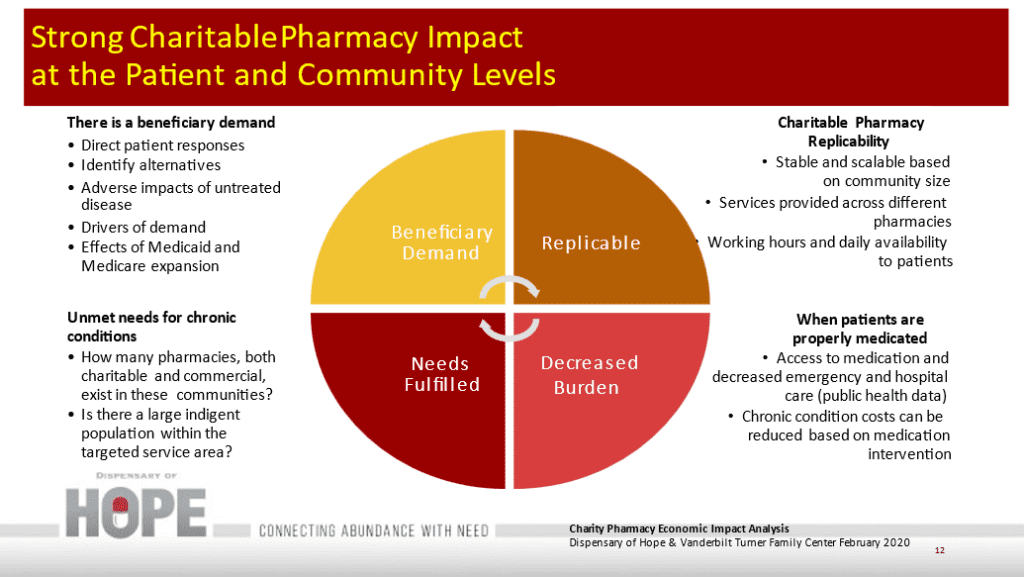[A charitable pharmacy] “allows people to manage their health and feel empowered, to have dignity, stay with their families, work at their jobs, and have a life.”
– Carolyn Salsgiver, Vice President Community Health Equity, Bridgeport Hospital, Yale New Haven Health System.
Medication access matters.
For the millions of Americans who may not be able to afford their prescriptions, charitable pharmacies can help close a critical gap in health care access. Unlike other safety net services located across the country, a charitable pharmacy is the single best way to ensure stable access to consistent supplies of medications for those unable to afford them. In addition, a community charitable pharmacy benefits the financial position of local healthcare, and provides a substantial impact on the health and well-being of the community. A charitable pharmacy “allows people to manage their health and feel empowered, to have dignity, stay with their families, work at their jobs, and have a life.”
In the last half of 2019, the Center for Disease Control (CDC) estimated that approximately 35.7 million people of all ages living in the United States did not have health insurance. Whether in cities, towns or rural communities, they may be ineligible or unable to afford insurance. Some are even our neighbors and friends. Per Kaiser Family Foundation studies repeatedly demonstrate that uninsured people are less likely than those with insurance to receive preventive care and services for major health conditions and chronic diseases. In 2019, three in ten uninsured adults went without needed medical care due to cost. A vulnerable subset of the population are adults over 65 years old, who are ineligible for Medicare due to their immigrant status.
Why Bridgeport, Connecticut started a charitable pharmacy
Christine Toni, BS Pharm. Interviewer, former coordinator of Hope Dispensary of Greater Bridgeport (HDGP).
Bill Hoey, VP of Mission Integration, St. Vincent’s Medical Center, Hartford Healthcare
Carolyn Salsgiver, VP of Community Health Equity, Bridgeport Hospital, Yale New Haven Health System
Angela Faulhaber, Pharm D, current coordinator of HDGB
Educating Providers About Medication Access and Charitable Pharmacies
HOPE Dispensary of Greater Bridgeport (HDGB)
Christine Toni, BS Pharm. Interviewer, former coordinator of Hope Dispensary of Greater Bridgeport (HDGP).
Bill Hoey, VP of Mission Integration, St. Vincent’s Medical Center, Hartford Healthcare
Collaborations
Through collaborations in medication access and distribution, health system flow is improved, efficiency is positively impacted, and community health risks decline. Corporately responsible pharmaceutical manufacturers donate much-needed medications that reach low-income and vulnerable patients who would not otherwise be able to afford them.
Generous pharmaceutical manufacturers and others donate to…
Charitable medication distributors, who provide critical medicine with reliable access to…
Charitable pharmacies and safety-net clinics to provide for…
The people who need it the most but cannot afford it, free or at low cost.
Measuring the Impact of Charitable Pharmacies
Medication access matters. In conjunction with pharmacy services, medication access has been shown to improve patient outcomes. In February 2020, Dispensary of Hope and Vanderbilt Turner Family Center investigated developing a validated tool to assess the impact of charitable pharmacies on patients and their communities. The analysis focused on 4 key points:
Beneficiary Demand – What patients need
Needs Fulfilled – What unmet needs exist and how the charitable pharmacy is meeting them
Charitable Pharmacy is able to be replicated to fit needs of population & community
Decreased burden for patient, healthcare, & community when patients are properly medicated
A charitable pharmacy is a model that works in many and diverse settings: urban, rural, mail-order, part of a health system or existing pharmacy, or stand-alone. States and communities see the benefits of collaboration with a program that meets the incredible need for medication access.
Impact
The impact goes beyond the patient who can dependably receive their medication. Families have more available income for other expenses. Hospitals and emergency departments have fewer patients looking for medications for their chronic conditions and shorter hospital stays. Providers are acquiring sensitivity to the challenges of those who lack insurance.





